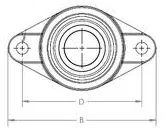Nov . 05, 2024 13:23 Back to list
custom deep groove ball bearings
Understanding Custom Deep Groove Ball Bearings
Custom deep groove ball bearings are essential components in various mechanical systems, serving as critical support for rotating parts. Their design allows them to handle a combination of radial and axial loads, making them versatile and widely used in numerous applications. In this article, we will explore the unique features, advantages, manufacturing processes, and applications of custom deep groove ball bearings.
Features of Deep Groove Ball Bearings
Deep groove ball bearings are characterized by their deep raceway grooves, which allow them to accommodate a significant amount of load. This design provides excellent stability and durability. The inner and outer rings of the bearing are designed to hold high-quality steel balls, which roll smoothly along the raceways, minimizing friction. A notable feature of custom versions is their ability to be tailored to specific tolerances and dimensions, making them suitable for unique applications in various industries.
Advantages of Customization
One of the primary benefits of custom deep groove ball bearings is their adaptability
. Standard bearings may not always meet the specific requirements of certain applications, particularly in specialized machinery or equipment. Custom bearings can be designed to fit unique dimensions, load capacities, and environmental conditions, such as unusual temperatures or corrosive environments. This customization can enhance the performance of machinery, reduce downtime, and even extend the service life of the components.Additionally, custom bearings can be produced with specialized materials and coatings to provide enhanced resistance to wear, corrosion, and other environmental factors. For instance, stainless steel or ceramic options can be utilized in applications where standard steel might fail due to exposure to moisture or chemicals.
Manufacturing Processes
custom deep groove ball bearings

The production of custom deep groove ball bearings involves several precise manufacturing processes. Initially, high-grade raw materials are selected based on the required specifications. The steel is often treated to improve its hardness and wear resistance.
The manufacturing process typically includes steps such as forging, machining, and heat treatment. After forming the components, they undergo strict quality control measures to ensure proper dimensions, surface finish, and overall performance. Advanced technologies such as computer numerical control (CNC) machining are often employed for high precision.
Applications Across Industries
Custom deep groove ball bearings are found in a wide array of applications across various industries. They are utilized in automotive systems, electric motors, household appliances, industrial machinery, and even aerospace applications. Their ability to support both radial and axial loads makes them ideal for dynamic environments where space is limited but robust performance is necessary.
In the automotive sector, these bearings are essential for wheel hubs, transmission systems, and engines, ensuring smooth operation and reliability. In industrial applications, they support conveyor systems, pumps, and robotics, where efficiency and durability are critical.
Conclusion
Custom deep groove ball bearings play an integral role in modern machinery and equipment. Their unique design, coupled with the ability to tailor specifications to meet specific needs, offers significant advantages to manufacturers and end-users alike. By investing in custom solutions, companies can enhance the efficiency and reliability of their products, ensuring they remain competitive in a fast-paced market. As technology continues to advance, the demand for high-quality custom deep groove ball bearings will undoubtedly grow, underscoring their importance in various industrial applications.
Latest news
-
25MM 2 BOLT UCFLX05-14 Flange bearing unit( oval)
NewsMar.07,2025
-
4 bolt UCF 200 series Pillow block bearings
NewsMar.07,2025
-
25MM 2 BOLT UCFLX05-14 Flange bearing unit( oval)
NewsMar.07,2025
-
UCF216-50 4-Bolt Flange Housing Square Bearing
NewsMar.07,2025
-
25MM 2 BOLT UCFLX05-14 Flange bearing unit( oval)
NewsMar.07,2025
-
spherical roller bearing material exporter
NewsMar.07,2025





